0049: MVC Part II – the ComboBoxText
- a Few Simple Examples
Continuing from last time…
Of the two Models used in GTK, the TreeStore and the ListStore, the latter is the least complex because it adheres to a flat data Model, so we’ll begin with that. As mentioned last time, GTK widgets that use a ListStore are:
ComboBox,ComboBoxText, andTreeView.
Let’s start with the simplest of the bunch…
The ComboBoxText (without Entry)
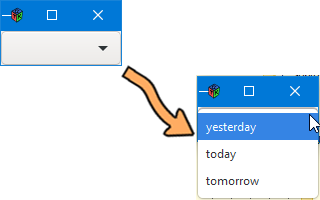
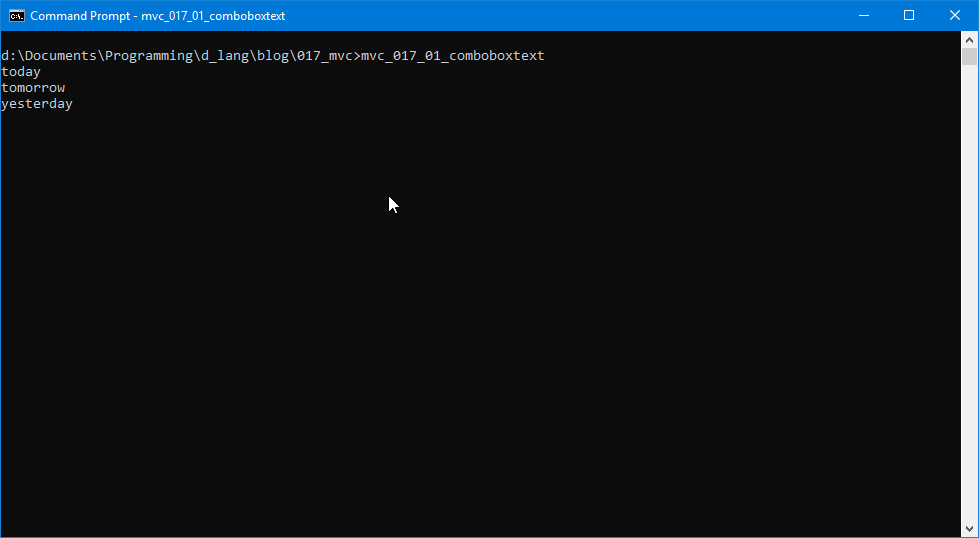
You might think the ComboBox would be the simpler of the two, but ComboBoxText is specialized for use with text only while ComboBox can be used with text, numbers of various types, and also images. This means we can take advantage of all the text-related assumptions made by the ComboBoxText’s functionality and get away with less work and less code. We won’t have to deal with CellRenderers or even the ListStore itself, not directly.
As usual, our first example of a ComboBoxText is instantiated inside an AppBox which, in turn, is instantiated inside a TestRigWindow, so we don’t need to look at those. The class we’re looking at first is this:
class DayComboBoxText : ComboBoxText
{
private:
string[] days = ["yesterday", "today", "tomorrow"];
bool entryOn = false;
public:
this()
{
super(entryOn);
foreach(day; days)
{
appendText(day);
}
addOnChanged(&doSomething);
} // this()
void doSomething(ComboBoxText cbt)
{
writeln(getActiveText());
} // doSomething()
} // class DayComboBoxText
Not a lot to look at here… Call the super-class constructor, appendText() a bunch of strings, and we’ve got a working widget.
Also as usual, the doSomething() function is just a stubby little thing that shows how the widget signal addOnChanged() is harnessed. We’ll look more closely at that signal in a bit because it does have its foibles, but right now I want to draw your attention to the initialization section where we find…
The entryOn Variable
By default, the ComboBox and the ComboBoxText both assume you want an Entry attached to your drop-down list. But I wanted to start with the simplest form of this widget, so here it’s turned off. It’s extra code, but we end up with extra simplicity.
The ComboBoxText with a Preselected Item
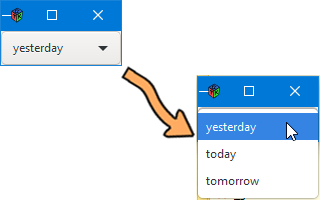
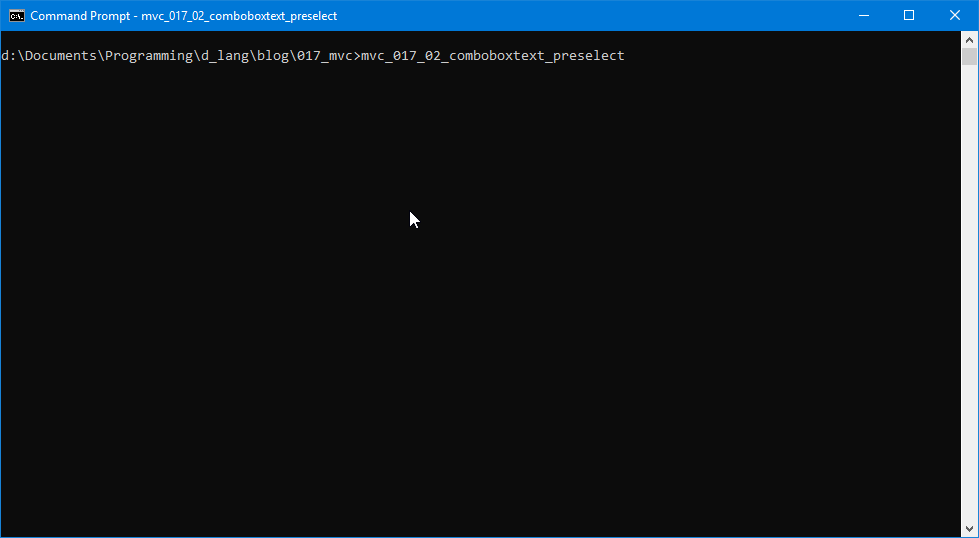
The difference between example #1 and example #2, a ComboBoxText with a pre-selected item, is minimal. We just add a single line of code to the constructor:
setActive(0);
And that’s all it takes to have one of our list items selected and showing on start-up. Just so you know, 0 is an index into the list of items, so we could also have set it to 1 or 2.
The ComboBoxText with Entry

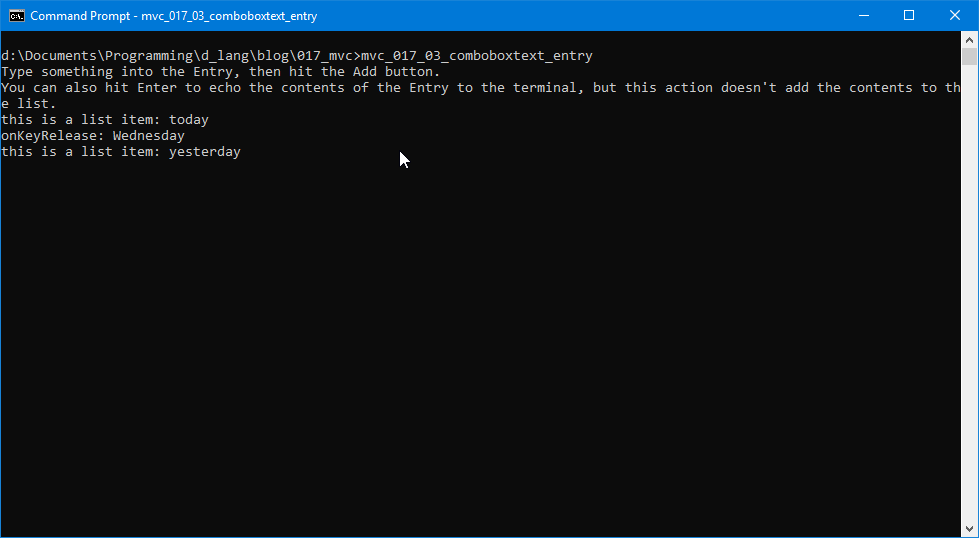
Now we get to the Entryfied version with example #3, a ComboBoxText with an Entry. These examples are all really the same code with a few changes, so we’ll skip right to them. For starters, here’s the initialization section:
string[] days = ["yesterday", "today", "tomorrow"];
bool entryOn = true;
The entryOn variable is, of course, now true which makes the Entry appear.
In the constructor, there’s a new line of code hooking up a second signal/callback:
addOnKeyRelease(&onKeyRelease);
And we’ll talk about that in a moment. For now, I wanna talk about…
The Foible of the onChanged Signal
Now we run headlong into that foible I mentioned earlier… The onChanged signal doesn’t distinguish between these two actions:
- typing in the
Entry, and - selecting an item from the drop-down list.
If we don’t help it distinguish between these two actions, the callback will be triggered whenever the user hits a key. It’s messy and it might lead to unseen complications somewhere down the road, so here’s the plan:
When the onChanged signal’s callback is triggered, the first thing we’ll do is check which item is active:
void onChanged(ComboBoxText cbt)
{
if(getIndex(getActiveText()) !is -1)
{
writeln("this is a list item: ", getActiveText());
}
} // onChanged()
If the index is any number from 0 and up, that tells us the text currently in the Entry is an item from the drop-down. But, if we get an index of -1, the text only exists in the Entry which that tells us the onChanged signal is reacting to the user typing.
If for some reason you want to do something with every incoming keystroke, now’s your chance. Just follow the if with an else and you’re good to go.
Running the Example
Once you’ve compiled the code, the following actions will be demonstrated:
- selecting from the list will result in the selection being echoed to the terminal,
- text typed into the
Entrywill not show up in the terminal until you hit the Enter key. That’s where the second signal,onKeyRelease, is triggered.
And speaking of which, let’s look at the onKeyRelease callback:
bool onKeyRelease(Event event, Widget w)
{
bool stopHereFlag = true;
if(event.type == EventType.KEY_RELEASE)
{
GdkEventKey* keyEvent = event.key;
if(keyEvent.keyval == GdkKeysyms.GDK_Return)
{
writeln("onKeyRelease: ", getActiveText());
}
}
return(stopHereFlag);
} // onKeyRelease()
As mentioned, it’s triggered when the user hits the Enter key. In actuality, it goes off every time a key is pressed, but we use the if() statement to ignore everything except Enter.
Conclusion
And that’s all for this time. Next time, we’ll continue this discussion while looking at how to add and remove items from the ComboBoxText’s list.
See you then.
Comments? Questions? Observations?
Did we miss a tidbit of information that would make this post even more informative? Let's talk about it in the comments.
- come on over to the D Language Forum and look for one of the gtkDcoding announcement posts,
- drop by the GtkD Forum,
- follow the link below to email me, or
- go to the gtkDcoding Facebook page.
You can also subscribe via RSS so you won't miss anything. Thank you very much for dropping by.
© Copyright 2023 Ron Tarrant
